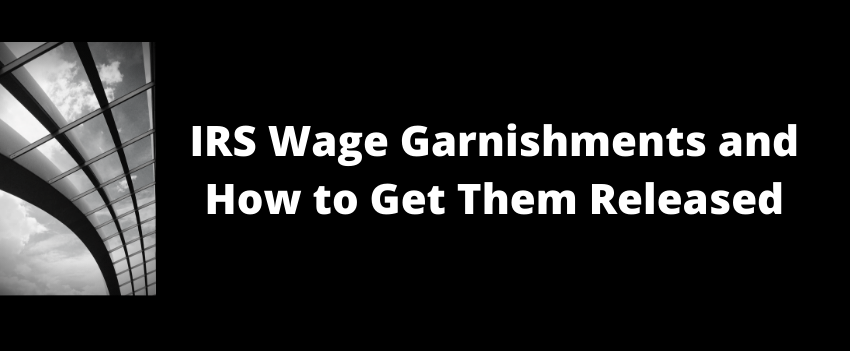In the event that you owe taxes to the IRS and do not have an arrangement to pay such as an extension, payment plan, offer in compromise, or “currently not collectable” status, the IRS may seek wage garnishment. IRS wage garnishments are funds taken directly out of your pay from your employer in order to reduce your tax debt. Finding yourself subject to a levy on your income is not an enviable position; being informed can help you avoid the situation entirely or lessen its hardships. Here’s what you should know about IRS wage garnishments and how to get them released.
You Will Be Notified Before a Garnishment is Issued
The IRS typically issues 5 notifications over the course of a few months prior to actually issuing a garnishment. During this time, you are given the opportunity to enter into an arrangement to pay. If you do not respond promptly with notice of your intent or eligibility to enter into one of the above arrangements, you are unlikely to be able to get the levy released once it has been put into place.
The IRS Will Contact Your Employer to Set Up Your Garnishment
Because the IRS has the EIN(s) from your W2s, 1099s, and/or tax returns, they know your income sources and financial account information and can easily figure out where you work. Rather than notifying you of the levy on your wages, the IRS will set up a wage garnishment with your employer, who will then notify you that it has been enacted.
While the levy won’t take 100% of your wages, it will persist until your balance has been paid in full, at which time a garnishment release will be sent to your employer. Once you qualify for a release, you can expedite the process by having your employer ask to have it faxed through while they are on the phone with the IRS to confirm receipt.
There are Several Ways to Release the Garnishment
To have the garnishment released, you must either pay your outstanding balance in full, enter into an eligible collection agreement, or prove to the IRS that the collection is causing significant hardship and you cannot pay your basic living expenses.
According to IRS Mind, you may be able to use an extension to pay (ETP) to release the wage garnishment if you have not previously used such a postponement and have not violated any previous agreements. If you have any unfiled tax returns in the past 6 years, however, it is unlikely that the IRS will release you for any reason.
The best way to avoid the hardship of a wage garnishment is to prevent it from happening in the first place. If you foresee owing money on your taxes and will not be able to pay, educate yourself on collection alternatives and plan to enter into a payment plan, apply for an extension, or provide documentation for non-collectible status. If you do receive a notice that the IRS plans to place a levy on your wages, make sure to respond promptly and work with IRS Collection to resolve the issue as soon as possible.
